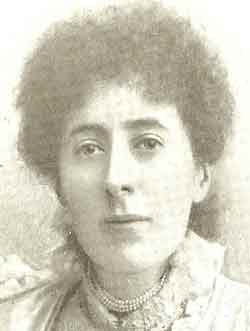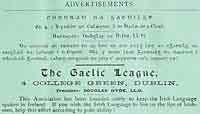Ethna Carbery was the pen name of Anna Johnston – a poet, writer and editor as well as a strong supporter of Irish nationalism.
She is probably best remembered now as the author of the Irish rebel song Roddy McCorley, made popular by bands like The Clancy Brothers and The Dubliners.
In her lifetime, however, she was better known as a poet and for her involvement in nationalist publications.
Ethna Carbery, Anna Johnston, Anna MacManus

The use of Carbery as a pseudonym sometimes causes confusion as it means she is known by three different names at different times.
Her maiden name as Johnston. She then married the folklorist Seamus MacManus and took his name.
When she started writing, she used the name of Ethna Carbery to avoid being confused with her husband who was also a writer.
An Irish nationalist
Carbery was born into a nationalist family from Ballymena in County Antrim.
She was firmly nationalist herself and became a member of the Gaelic League and the Irishman’s Association.
Together with a friend, Alice Milligan, she founded two nationalist magazines, The Northern Patriot and The Shan Van Vocht. The magazines invited nationalists to contribute articles but most of the material published into the two journals was written by Carbery and Milligan themselves.
They showed considerable determination in running the two publications with little help from others.
MacManus was devastated by Carbery’s death
Carbery died in 1902 at the age of 36. MacManus was devastated by her death and could not bring himself to write about her until several years later.
When he did so he left a series of recollections in the hope that they would be used by a writer in the future who could provide the detachment needed to write her biography.
As might be expected, the recollections paint a glowing picture and MacManus gives an interesting insight into the level of Carbery’s patriotism.
Carbery would sacrifice everything for her country

Macmanus describes how “Ireland was the dearest thing on earth to her”.
He writes: “For her country’s sake she would gladly sacrifice everything else that she prized–and joyously sacrifice herself. She loved all who worked for Ireland. She worshipped all who died for Ireland.”
In spite of this, however, “her humility was such that she did not reckon herself among the patriots–only thought of herself as one of the crowd who tried to encourage the patriots with their earnest plaudits.”
Tireless work for the nationalist cause
MacManus also describes how Carbery and Milligan worked tirelessly to promote the nationalist cause with their two magazines.
They wrote nearly all the poems and articles featured, edited it, collated all the subscriptions and managed it in every way by themselves.
“With their own hands they folded and addressed every copy that was to go out, and licked every stamp that was to carry it on its journey to Ireland’s faithful soldiers, veterans and recruits.”
Roddy McCorley barely noticed in her lifetime
After her death, MacManus collected her poems and other works and published them in three separate volumes – The Four Winds of Eirinn, The Passionate Hearts and In the Celtic Past.
Roddy McCorley was among the poems published in The Four Winds of Eirinn.
In his recollections of Carbery, ManManus refers to many of her poems and other works but never once mentions Roddy McCorley, suggesting that although it is now the piece for which she is best remembered, it was not considered one of her major works during her lifetime.